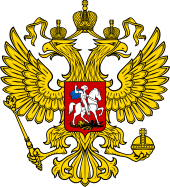
Back Russiese wet op gay propaganda Afrikaans قانون دعاية المثليين في روسيا Arabic Ruský zákon proti LGBT propagandě Czech Ley rusa contra la propaganda homosexual Spanish Interdiction législative de la propagande homosexuelle en Russie French החוק נגד תעמולה הומוסקסואלית HE Undang-undang federal anti-propaganda homoseksual Rusia 2013 ID Legge russa sulla propaganda gay Italian ロシアにおける同性愛宣伝禁止法 Japanese 동성애 선전 금지법 Korean
| Anti-LGBT law | |
|---|---|
 | |
| Federal Assembly | |
| |
| Signed by | President Vladimir Putin |
| Signed | 30 June 2013 |
| Legislative history | |
| Introduced by | Yelena Mizulina (SR) |
| First reading | 11 June 2013 (State Duma) |
| Second reading | 27 June 2013 (Federation Council) |
| Related legislation | |
| On Protecting Children from Information Harmful to Their Health and Development | |
| Summary | |
| Censors information about the existence of the LGBT community | |
| Keywords | |
| Censorship LGBT rights in Russia | |
| Status: In force | |
| Part of a series on |
| LGBT rights |
|---|
 |
| Lesbian ∙ Gay ∙ Bisexual ∙ Transgender |
|
|
For the Purpose of Protecting Children from Information Advocating a Denial of Traditional Family Values, commonly known as the Russian anti-LGBT law[1][2][3][4] or as the Russian anti-gay law,[5][6][7][8] is a law of Russia. It was unanimously passed by the State Duma on 11 June 2013 (with only one member abstaining—Ilya Ponomarev),[7] unanimously passed by the Federation Council on 27 June 2013,[9] and signed into law by President Vladimir Putin on 30 June 2013.[6]
The stated purpose of the Russian government for the law is to prevent the presentation of the LGBT community as a normal part of Russian society under the argument that LGBT rights in Russia contradict traditional Russian values. The statute amended the Russian law On Protecting Children from Information Harmful to Their Health and Development and the Code of the Russian Federation on Administrative Offenses, to prohibit the distribution of "propaganda of non-traditional sexual relationships" among minors. This definition includes materials that "raises interest in" such relationships, cause minors to "form non-traditional sexual predispositions", or "[present] distorted ideas about the equal social value of traditional and non-traditional sexual relationships." Businesses and organizations can also be forced to temporarily cease operations if convicted under the law, and foreign nationals may be arrested and detained for up to 15 days then deported, or fined up to 5,000 rubles and deported.
The support of the Russian government for the law appealed to social conservatives, religious conservatives, and Russian nationalists. The law was condemned by the Venice Commission of the Council of Europe (of which Russia was a member of at the time of the enactment of the law), by the United Nations Committee on the Rights of the Child and by human rights organizations, such as Amnesty International and Human Rights Watch. The statute was criticized for its broad and ambiguous wording (including the aforementioned "raises interest in" and "among minors"), which many critics characterized as being an effective ban on publicly promoting LGBT culture and LGBT rights. The law was also criticized for leading to an increase and justification of homophobic violence,[10] while the implications of the laws in relation to the then-upcoming Winter Olympics being hosted by Sochi were also cause for concern, as the Olympic Charter contains language explicitly barring various forms of discrimination.
In December 2022, an amendment to the law was signed into law by Putin, prohibiting the distribution of "propaganda of non-traditional relationships" among any age group. It also prohibits the distribution of materials that promote gender dysphoria among minors.
- ^ Caleb Davis (10 January 2023). "Russian publisher investigated by authorities under new anti-LGBT law - lawmaker". Reuters. Retrieved 6 March 2024.
- ^ Lou Roméo (26 November 2022). "Anti-LGBT law in Russia: 'Leaders want to construct a united conservative base'". France 24. Retrieved 6 March 2024.
- ^ "Russia: Anti-LGBT Law a Tool for Discrimination". Human Rights Watch. 29 June 2014. Retrieved 6 March 2024.
- ^ "First Probe Opened Into Breach of Russia's New 'LGBT Propaganda' Law". The Moscow Times. 10 January 2023. Retrieved 6 March 2024.
- ^ Cite error: The named reference
variety-gaychallengewas invoked but never defined (see the help page). - ^ a b "Russia passes anti-gay-law". The Guardian. 30 June 2013. Retrieved 14 February 2014.
- ^ a b "Russian 'Anti-Gay' Bill Passes With Overwhelming Majority". RIA Novosti. 11 June 2013. Retrieved 18 June 2014.
- ^ Cite error: The named reference
newyorkerwas invoked but never defined (see the help page). - ^ "Moscow to launch law against gay propaganda and adoptions". AsiaNews. 27 June 2013.
- ^ Cite error: The named reference
ie-huntedwas invoked but never defined (see the help page).
© MMXXIII Rich X Search. We shall prevail. All rights reserved. Rich X Search